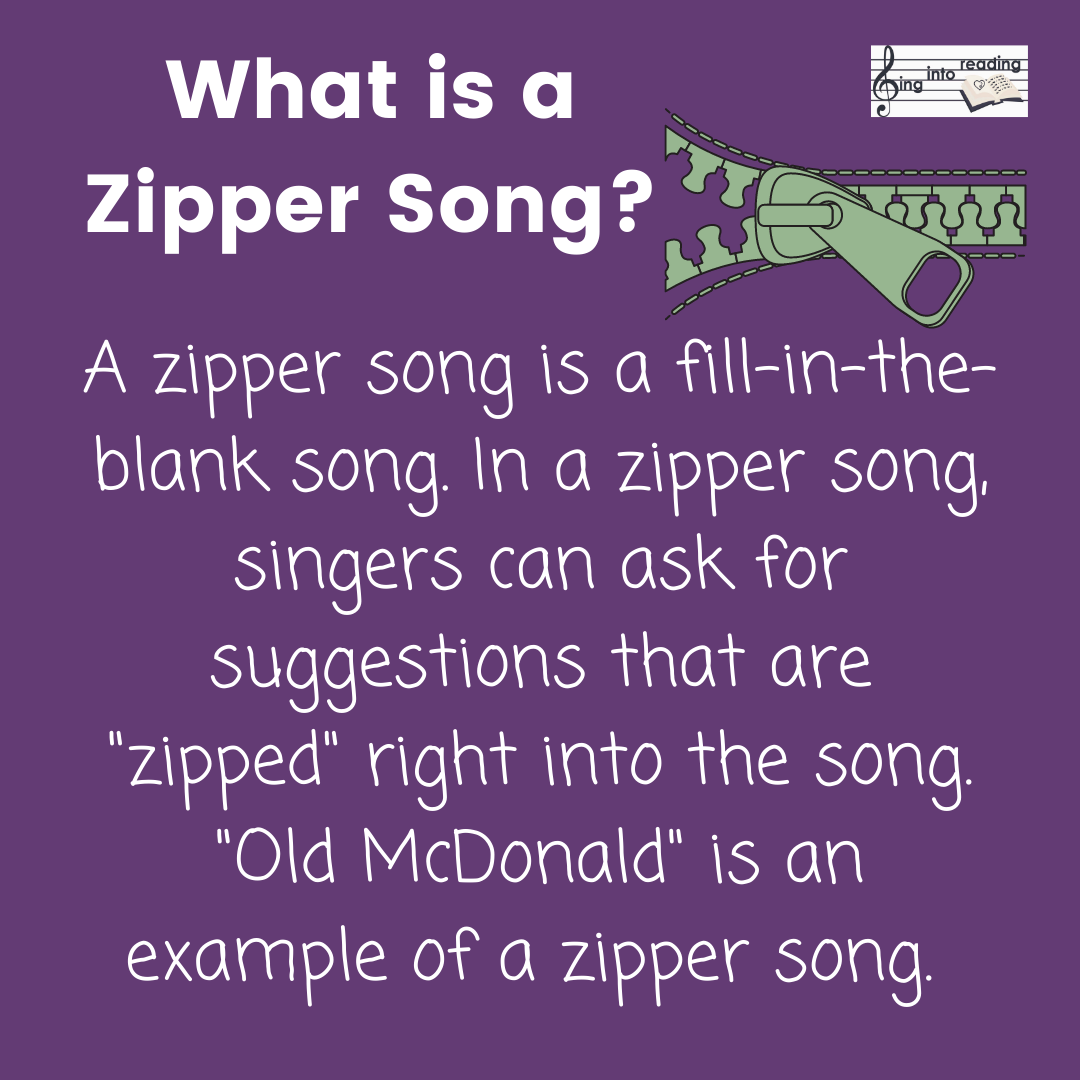Sing into Reading: the Blog
Little ones love literacy.
Music is magic!
Zipper Songs
Zipper songs are fantastic tools for teaching literacy. A zipper song is a "fill-in-the-blank song." I ask the children to fill in the blank, and zip their ideas right into the song. For example, my song, "Holidays are For Family" is a zipper song, since I can ask the students their favorite holidays and then sing about them.
In this blog, I talk about how to use zipper songs to teach literacy. Zipper songs can be used for modeled reading, shared reading, modeled writing, interactive writing, independent reading, and independent writing. The suggestions students make for zipper songs can easily be a springboard into word study and phonics work.
What is your favorite zipper song?
Keep singing,
Risa

A Child in the World: The Developmental-Interaction Approach
At Bank Street College, I learned the developmental-interaction approach, or "The Bank Street Approach." This progressive approach to education is a whole-child approach that places as much value on a child's social and emotional development as on a child's academic development. At Sing into Reading, we value SEL (social emotional learning).
One of the hallmarks of the developmental-interaction approach is the child-centered social studies curriculum. We start our social studies curriculum with the center: the self. A child moves through the curriculum in ever-widening arcs of experience, progressing through a family study, a community study, national studies, international studies, and then astronomy. Just as Maria Montessori talks about "sensitive periods" - periods of time when a child is easily able to learn certain concepts, the developmental-interaction approach recognizes that a child is self-centered, and that their interest in the outside world expands over time. At Sing in...
Literacy in Progressive Education
I am a progressive educator - to the core.
I received my M.S.Ed. in Early Childhood/Elementary Education from Bank Street College, where I learned the developmental-interaction approach. This is a constructivist approach. Teachers using a constructivist approach facilitate a learning environment where a child is encouraged to construct their own knowledge. Constructivist theory says that students do not simply soak up knowledge "like a sponge." They see children constructing knowledge as a more active task. The developmental-interactive approach distinguishes itself from other constructivist approaches by the emphasis placed on the child's emotional life. In the developmental-interactive approach, a child's emotional life and SEL (social emotional learning) skills are seen as equally important and intrinsically connected to academic skills.
I also studied at The Reading and Writing Project (TRWP) at Teachers College, Columbia University. There, I learned balanced literacy, a progress...
Montessori Songs
Today I presented "Montessori Songs" at the Early Childhood Global Mastermind Group, a group of early childhood educators from around the world. They has asked me to present "Montessori Songs."
I wanted to share the presentation with you!
Learn songs that help a child develop a sense of self, and their place in the world. These songs are perfect for a Montessori classroom, or any preschool setting.
New Year
Happy New Year!
January is my favorite month of the year. It's my birthday month, and, in January we celebrate one of our country's heros: Dr. Martin Luther King, Jr.
I also enjoy setting New Year's goals. Let's be clear - I always enjoy personal development - any time of year.
The concept of a year, and time in general, is enigmatic. Time is a continuum, and dividing it into units - seconds, days, weeks, months, and years - is a big concept for kids to understand. So be sure to teach and review it often. Sing days of the week songs, and months of the year songs. Sing "It's a New Year!"
It's hard for grownups to understand time, too. All I know is, the older I get, the faster it moves.
I wrote a new song, "It's a New Year." Listen to it on the blog, and let me know what you think of it.
Ask your children (four and older) what they want to do this year. Maybe they want to learn to ride a bike, swim, or tie their shoes. Maybe they want to sing more. Or, maybe they want to read! G...
Slow Down
Sometimes you need to slow down so you can speed up again.
Creating a Literacy-Rich Environment
Members of Sing into Reading receive excellent instruction for children teaching literacy through music and love. For a limited time, members will also receive instruction for parents: "Teach Your Child to Read With Music and Love." Check out this sample class, "Creating a Literacy-Rich Environment."
Gratitude
This blog is one you can share with the kids.
I talk about choosing appreciation and gratitude.
Please join me November 27 at 11:30 am EDT for the Thanks and Giving Celebration, a free sing-along for kids and their grownups. Sign up here: www.singintoreading.com/thanks-and-giving
And here are some quotes on gratitude for the grownups:
Stephen Richards: “When you express gratitude for the blessings that come into your life, it not only encourages the universe to send you more, it also sees to it that those blessings remain.”
Todd Stocker: “Thankfulness creates gratitude which generates contentment that causes peace.”
Zig Ziglar: “Gratitude is the healthiest of all human emotions. The more you express gratitude for what you have, the more likely you will have even more to express gratitude for.”
Henri Frederic Amiel: “Thankfulness is the beginning of gratitude. Gratitude is the completion of thankfulness. Thankfulness may consist merely of words. Gratitude is shown in acts.”
Ris...
Jenni reads Zin! Zin! Zin! a Violin by Lloyd Moss, Illustrated by Marjorie Priceman
Jennifer Miller, a talented minister and teacher, read to us. Jenni is a "rockin reader!"
I know you will enjoy her reading of Zin! Zin! Zin! a Violin by Lloyd Moss, Illustrated by Marjorie Priceman.
Keep singing,
Risa
Write Every Day
Write every day.
Happy World Literacy Day!
Keep singing,
☮️ ❤️ 🎼
Risa


